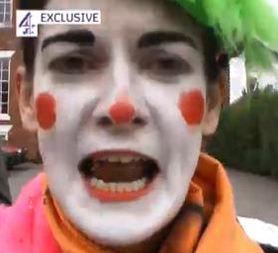‘Undercover police officer’ filmed in clown costume
New footage obtained by Channel 4 News shows a woman, believed to be an undercover police officer, taking part in anti war protests dressed as a clown.

The video of ‘Lynn Watson’, who led a double life between 2003 and 2008, shows her with the non-violent radical group who called themselves the Clandestine Insurgent Rebel Clown Army.
In the footage filmed in 2004 she is seen shaking her backside outside an MP’s office and playing cricket with a feather duster during a protest against the Iraq war.
It is believed that she was deployed by the National Public Order Intelligence Unit and she was embedded in the peace and environmental activist movements in Leeds for five years.
Channel 4 News’ exclusive footage also shows her participating in a game of “let’s play tangle”, in which clowns join hands and wrap their arms around each other in a circle.
She turns to the camera and says: “We are checking for clowns, we need more clowns in this country – more clowns.” Another shot shows her stroking a tree, saying: “Tickle the tree, tickle the tree.”
Apology
The news comes against a backdrop of Britain’s most senior public order police officer apologising to MPs after providing them with false information when he denied having plain-clothes officers in the crowd at the G20 demonstrations two years ago.
Commander Bob Broadhurst said the information was “true to the best of my knowledge at the time” but it has since emerged that both plain-clothes and covert officers were deployed during the protests.
Giving evidence to MPs a month after the protests, in which thousands of demonstrators clashed with police in London in 2009, the senior Scotland Yard officer insisted there were no plain-clothes officers among the crowd, saying it would have been too dangerous to do so.
But questions arose about his evidence in the wake of the unmasking of undercover officer Mark Kennedy, who attended many demonstrations during seven years living as a spy among green activists.
Last week, the Met issued a statement correcting the testimony given by Mr Broadhurst on May 19, 2009.
He told MPs then: “We had no plain-clothes officers deployed within the crowd. It would have been dangerous for them to put plain-clothes officers in a crowd like that.
“The only officers we deploy for intelligence purposes at public order are forward intelligence team officers who are wearing full police uniforms with a yellow jacket with blue shoulders. There were no plain-clothes officers deployed at all.”
But this month’s statement read: “Having made thorough checks on the back of recent media reporting we have now established that covert officers were deployed during the G20 protests.
“Therefore the information that was given by Commander Bob Broadhurst to the Home Affairs Select Committee (Hasc) saying that ‘We had no plain-clothes officers deployed within the crowd’ was not accurate.
“The officers were covertly deployed by the MPS (Metropolitan Police Service) to G20 protests to identify individuals who may be involved in the organisation of criminal activity and to give live time intelligence/evidence as to the protesters’ activity.”
But Metropolitan Police Acting Commissioner Tim Godwin told the Home Affairs Select Committee today that the sheer size of the protests meant that information about the presence of uncover or covert officers was not always infallible.
“When you actually run a huge operation on the scale Commander Broadhurst was running, you can’t know everything all the time,” he said
“And equally, the intelligence don’t always know the source.
“However, I think what this has done is given us a sharp lesson and we will look at that.”
He added: “With 55,000 people, 750,000 crimes, I can’t always say that someone won’t make a mistake. and equally I can’t always say that commanders will know what every single member of our staff are doing.”
Giving evidence to the committee, Mr Godwin added: “The vast majority of men and women who fulfil this function on behalf of the police service are some of the bravest people that we actually have, and they have lots of controls… in terms of governance and oversight.”




